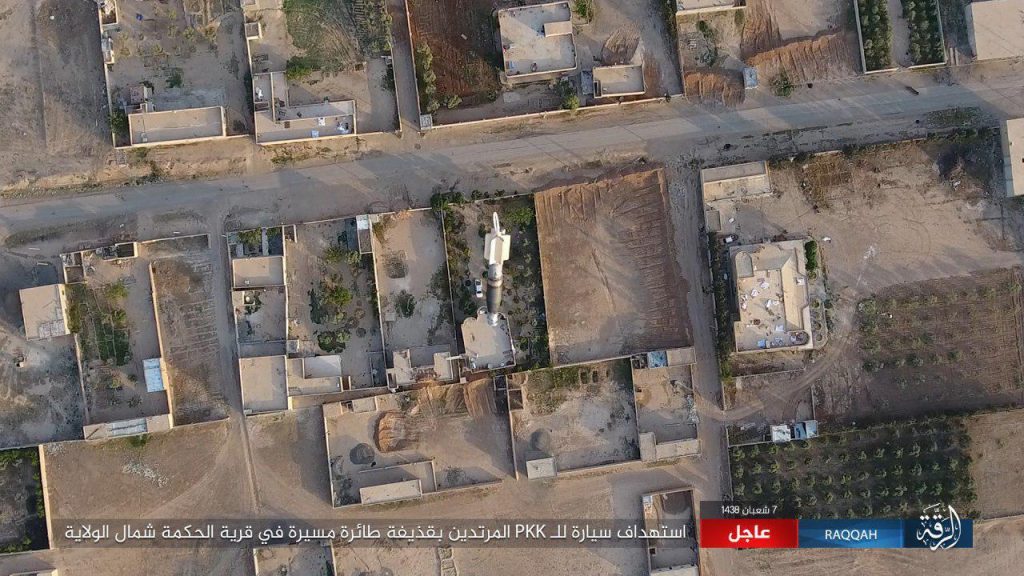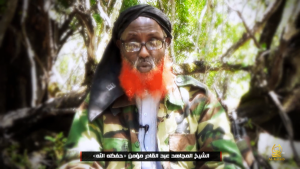
As the Islamic State attempted to hold onto the territory in its so-called caliphate, it deployed a fleet of small drones to harass its foes. The modified drones were deployed during the battle for Mosul, where they were used to perform surveillance and drop small explosives on approaching forces, as well as elsewhere throughout Iraq and Syria.
The US Treasury Department has now revealed new details about the jihadists’ procurement network for its tiny unmanned aerial vehicles (UAVs). Yesterday, Treasury designated three Islamic State facilitators as terrorists and sanctioned three associated entities as well.
The move further exposed the jihadists’ support networks in the Philippines, Somalia, and Turkey.
And one of the newly-designated terrorists, Yunus Emre Sakarya, has allegedly played a “key” role in acquiring UAV “components” since “at least 2015.” Sakarya established a “Turkey-based company, Profesyoneller Elektronik,” that year and has operated it ever since. Profesyoneller Elektronik, which is located in the Kecioren district of Ankara, “serves as an ISIS front company involved in the procurement of UAV-related materials” and, during the first half of 2016, “was involved in transactions for UAV-related equipment that totaled over $500,000 for ISIS.”
Sakarya is a dual citizen of Germany and Turkey, according to the US government’s identifying information. In addition to Turkey, he has operated out of Mayadin, Syria — a city on the Euphrates River in the eastern Syrian province of Deir Ezzor. Mayadin is a a known hub for the Islamic State’s leadership.
Indeed, the US-led coalition has waged a targeted air campaign against Abu Bakr al Baghdadi’s loyalists in Mayadin since the first half of 2017. US military officials say that some of those killed were involved in the Islamic State’s drone program. In Sept. 2017, for instance, the US announced that three drone developers and builders had been killed in airstrikes near Mayadin. [See FDD’s Long War Journal report, US-led coalition kills 3 Islamic State ‘drone experts’ in eastern Syria.]
Treasury does not say whether Turkish officials have knowingly allowed Sakarya to operate his front company, but the Islamic State’s facilitation network has run through Turkey for years. The Islamic State has continued to operate in Turkey despite launching terrorist attacks targeting civilians. Some of the group’s personnel even fled to the country after they lost ground in Iraq and Syria. For example, Treasury announced last year that the Islamic State’s “finance emir for Mosul” had relocated to the NATO ally’s turf.
ISIS-linked “financial operative” in Somalia
The second newly-sanctioned Islamic State figure is Mohamed Mire Ali Yusuf (Mire Ali), “an ISIS-aligned financial operative” who has “provided funds” to Abdulqadir Mumin.

Mumin (pictured on the right) was a Shabaab commander in the Puntland region. But he defected to the Islamic State in 2015, proclaiming his allegiance Abu Bakr al Baghdadi. The US designated Mumin as a terrorist in Aug. 2016.
Mire Ali has helped finance Mumin’s branch of the so-called caliphate, according to Treasury. Two of Mire Ali’s companies, Liibaan Trading and Al-Mutafaq Commercial Company, both of which are located in Bosaso (a city in Puntland), were added to the US government’s list of designated terrorist organizations as well.
Treasury says that Mire Ali “ran all of his business activities through” Liibaan Trading, in downtown Bosaso, as of mid-2016. Liibaan is a “livestock trading business” that has “served as a front for ISIS-aligned groups in the Bari region of Somalia.” His business has likely taken him to Dubai, too, as the government’s identifying information places him in the city.
An ISIS facilitator in the Philippines
The third ISIS facilitator designated as a terrorist is Abdulpatta Escalon Abubakar. Filipino authorities detained Abubakar “as he was traveling from the Gulf to the Philippines” in Sept. 2017, Treasury notes. The US has placed him in Jeddah and Daina, Saudi Arabia.
By the time of his capture, Abubakar had served the ISIS network in the Philippines for more than a year and a half.
Treasury has tracked a number of transactions that went through Abubakar, including a July 2016 transfer of about $20,000 that was “sent” by ISIS and “may have been used by ISIS elements in the Philippines to purchase arms.” This implies that the Islamic State directly funded at least some arms purchases for its upstart arm in Southeast Asia.
Abubakar facilitated a “transfer of approximately $50,000 to ISIS’s network in the Philippines” in Aug. 2016 and another $5,000 in July 2017. He also worked for a time with Isnilon Hapilon, the former leader of the Abu Sayyaf Group who defected to Baghdadi’s cause. According to the Filipino governent, Hapilon was killed in Marawi last year. In 2016, Hapilon had Abubakar “procure a large amount of ammunition and arms.” Abubakar also procured “improvised explosive device materials for Hapilon.”
from Long War Journal – FDD's Long War Journal http://ift.tt/2nWv0Dd
via Defense News
No comments: